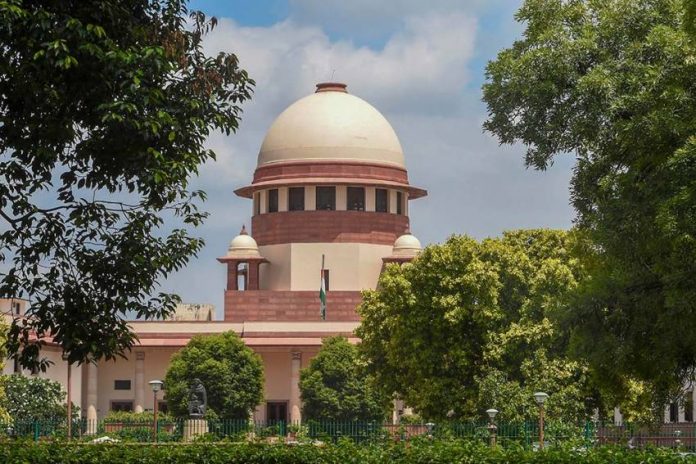This article is written by Vanya Verma from Alliance University, Bangalore. This article talks about brief facts of the case, Priti Saraf vs State of NCT of Delhi, the decision of the bench followed by judgement.
Table of Contents
Introduction
In the case of Priti Saraf and Anr. v. State of NCT of Delhi & Anr. (2021), the Bench of the Supreme Court had reversed the High Court decision. The High Court had exercised its powers under Section 482 of the Code of Criminal Procedure. The Bench held that though the facts that had been mentioned in the complaint/FIR/charge-sheet revealed a commercial transaction, that was no reason for holding that the offence of cheating was not made out especially when “many times, the offence of cheating is committed in the course of commercial transactions”.
Bench
The Supreme Court’s Division Bench, composed of Hon’ble Justice Indu Malhotra and Hon’ble Justice Ajay Rastogi, decided the case.
Brief facts of the case
The case’s facts revolve around the property in question namely, 37, Friends Colony (East), New Delhi, which is owned by the second Respondents. The said property was mortgaged for Rs. 18 crores with the State Bank of Patiala. The second Respondent allegedly cheated the appellants by forming a partnership with the broker, Ashok Kumar, in order to misappropriate the money paid by the appellants to settle these debts. The second Respondent was also accused of breaching the appellants’ trust by allegedly making a false promise to pay the latter the sum of Rs. 25.50 crores if the contract was not completed. Appellants paid a total of Rs. 12.5 crores at the time of execution. The second Respondent had been accused of attempting to defraud from the beginning of the agreement as there was a failure to meet the three conditions outlined in clause 3 of the agreement.
The mandatory requirements were due on March 22, 2011, but only two of them were completed by May 11 and June 2, 2011, respectively, leaving the third requirement unfinished.
On September 23, 2015, the Appellants filed a private complaint before the learned Magistrate under Section 200 read with Section 190 of the CrPC regarding the alleged offences committed by the second Respondent before the Saket Court in New Delhi. It was then forwarded to the police station in order to register an FIR under Section 156(3) on November 15, 2016, which was contested by the Respondents through a criminal revision, but was later dismissed by the ASJ & Special Judge (NDPS), South East, Saket Courts, New Delhi on April 26, 2017. On April 28, 2017, an FIR was filed against the second Respondent and Mr. Ashok Kumar under Sections 420, 406, and 34 of the Indian Penal Code (IPC).
On October 5, 2018, the investigating officer filed a charge sheet revealing that the second Respondent never obtained site plans sanctioned for the appellants. The High Court’s learned judge, on the other hand, solely considered the agreement to sell (24.12.2011) and the notification of termination (30.01.2011) without looking into other important facts and events that occurred throughout the course of the case. The Justice determined that the second Respondent’s actions amounted to a simple breach of contract and, as a result, cancelled all criminal proceedings, citing inherent power under Section 482 of the CrPC.
Arguments by the parties
The Appellants’ learned counsel based their argument on the fact that the High Court’s inherent power under Section 482 CrPC is an exceptional one, employed only in the rarest of rare cases. The counsel strongly disagreed with the High Court’s decision to ignore the case’s substantial facts, claiming that restricting the matter to a purely civil character and ignoring the criminal features involved is unsustainable in law and should be overturned by the Divisional Bench. The learned counsel for the second Respondent, on the other hand, claimed that the issue was solely civil in nature because the earnest money was only forfeited after the appellants failed to meet and perform the conditions of the agreement to sell dated December 24, 2011. Furthermore, the Respondent asserted that all three elements were met, citing documentary evidence as proof.
The decision of the bench
Supreme Court: The bench of Indu Malhotra and Ajay Rastogi, JJ, answered the “debated” question of when a criminal proceeding may be quashed, either in the exercise of the High Court’s extraordinary powers under Article 226 of the Constitution of India or in the exercise of the High Court’s inherent powers under Section 482 CrPC. The bench held that in the matter of exercise of inherent power by the High Court, the only requirement is to see whether the continuance of the proceedings would be a total abuse of the process of the Court.
“The exercise of the High Court’s inherent power is an extraordinary power that must be exercised with great care and caution before embarking on a review of the complaint/FIR/charge-sheet in order to determine whether the case is the rarest of rare cases, allowing the prosecution to scuttle at its inception.”
It is a well-established legal principle that in order to exercise powers under Section 482 CrPC, the complaint in its entirety must be examined on the basis of the allegations made in the complaint/FIR/charge-sheet, and the High Court was not under obligation to investigate or examine the matter at that time. Without any critical examination, whatever appears on the face of the complaint/FIR/charge-sheet will be taken into account. The offence should appear ex facie on the complaint/FIR/charge-sheet, as well as if any documentary evidence on record. (paragraph 23)
“The Criminal Procedure Code contains a detailed procedure for investigation, charge framing, and trial, and in the event that the High Court wishes to intervene in the complaint/FIR/charge-sheet in the exercise of its inherent jurisdiction, it must exercise proper circumspection with great care and caution.”
In the case of State of Haryana and Others Vs. Bhajan Lal and Others (1990), the Court clarified the ambit and scope of Section 482 of the CrPC, outlining important elements necessary for a case to be quashed by the High Court.
Furthermore, the Court relied on the decision in Nagpur Steel & Alloys Pvt. Ltd. vs. P. Radhakrishna and Others (1997), notably paragraph 3 of that decision, which stated:
“We attentively examined the complaint. The complaint could not, in our opinion, be considered to have failed to reveal the commission of an offence. It would be insufficient to hold that the offence was committed throughout the course of a commercial transaction to rule that the complaint did not deserve a trial. The truth or falsity of the allegations in the complaint was to be determined based on the evidence presented during the complaint case trial. It was unquestionably not a case where the criminal trial should have been shortened. The complaint’s dismissal resulted in a serious miscarriage of justice. As a result, without commenting on the merits of the matter, we grant this appeal, set aside the High Court’s order, and reinstate the complaint. The learned trial Magistrate will proceed with the complaint and resolve it as quickly as possible in conformity with the law.”
The Court was hearing a matter in which the second Respondent’s property was mortgaged with the State Bank of Patiala, with a total legal liability of Rs. 18 crores owed to the bank. To clear the said debts, the second Respondent formed a scheme with a broker to defraud and cheat the appellants/complainants, as well as misappropriate the funds paid by the complainants as part of the deal. The second Respondent also betrayed the appellants/complainants’ trust by falsely stating to the Appellants/Complainants that the second Respondent would be liable to pay a sum of Rs. 25.50 crores to the Complainant if the deal is not carried forward by the second Respondent.
While an FIR for the offence of cheating was lodged in the matter at hand, arbitral proceedings were also started at the request of the Appellants/Complainants.
The components of the offences under Sections 406 and 420 IPC cannot be deemed to be absent based on the accusations in the complaint/FIR/charge-sheet, the Court observed after a careful reading of the complaint/FIR/charge-sheet.
“…whether the claims in the complaint are otherwise correct or not, must be determined based on the evidence to be presented during the trial.” Simply because a remedy is provided for breach of contract or arbitral proceedings initiated at the Appellants’ request does not entitle the Court to conclude that civil remedy is the only remedy available and that the initiation of criminal proceedings, in any form, will be an abuse of the Court’s process for exercising inherent powers of the High Court under Section 482 CrPC for quashing such proceedings.”
The Court noted that the facts described in the current complaint/FIR/charge-sheet indeed disclose a business transaction, but it is hardly a justification to conclude that the offence of cheating would not be committed in such a transaction. In truth, cheating is frequently done in the course of economic transactions, as illustrated by Sections 415, 418, and 420 of the Indian Penal Code. So far as initiation of arbitral proceedings is concerned, there is no correlation with the criminal proceedings.
As a result, the Court determined that the issue at hand in the case at hand is not one in which the criminal trial should have been shortened. In exercising its inherent jurisdiction, the High Court was not justified in quashing the criminal proceedings. The High Court based its decision on two factors:
(i) the fact that the sale agreement was terminated due to an alleged breach of contract, and
(ii) the fact that the arbitral procedures were commenced at the request of the appellants.
The Court observed that both the alleged circumstances noticed by the High Court are unsustainable in law.
Judgement
It was held by the Court:
“On a careful reading of the complaint/FIR/charge-sheet in this case, we believe it is impossible to conclude that the complaint does not reveal the commission of an offence. On the basis of the allegations in the complaint/FIR/charge-sheet, the ingredients of the offences under Sections 406 and 420 IPC cannot be considered to be absent. We would like to point out that whether the claims in the complaint are true or false must be determined based on the evidence presented during the trial.” (paragraph 32)
The pending interlocutory applications were disallowed by the divisional bench, which found that they were submitted with malafide intentions under Sections 340 and 195 of the CrPC.
In conclusion, the Court held that the decision to quash the judgment by the High Court was incorrect and accordingly set aside. Thus, the appeal was successful.
Conclusion
To conclude the findings of the case in brief- the existence of civil remedies is not enough to stop criminal proceedings, according to the Court. The Court stated that just because a remedy is provided for breach of contract or arbitral proceedings initiated at the request of the Complainant does not entitle the Court to conclude that civil remedy is the only remedy and that the initiation of criminal proceedings, in any form, will be an abuse of the Court’s process for exercising inherent powers of the Court. The Court stated that in order to exercise powers under Section 482 CrPC, the Complaint must be assessed in its entirety on the basis of the allegations contained in the Complaint/FIR/charge-sheet, and the High Court was not under an obligation to go into the matter or examine its correctness.
References
- https://indiankanoon.org/doc/47961553/
- https://www.indiclegal.com/post/criminal-proceedings-need-not-be-quashed-merely-because-a-civil-remedy-is-available-sc
- http://cja.gov.in/E%20newsletter/eNewsletter%20%20March%202021.pdf
- https://www.scconline.com/blog/post/tag/section-482/
- https://www.barandbench.com/columns/the-lawyers-digest-supreme-Court-judgments-passed-in-march-2021
- https://main.sci.gov.in/supremecourt/2019/23258/23258_2019_42_1502_26857_Judgement_10-Mar-2021.pdf
LawSikho has created a telegram group for exchanging legal knowledge, referrals, and various opportunities. You can click on this link and join:
 Serato DJ Crack 2025Serato DJ PRO Crack
Serato DJ Crack 2025Serato DJ PRO Crack











 Allow notifications
Allow notifications


